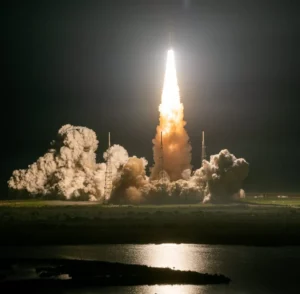
by Dick Hall-Sizemore
Because the focus of this blog is on Virginia politics and public policy, I am loath to venture beyond those boundaries. However, I have recently become concerned about an issue (nonpartisan, I hope) that has ramifications beyond the Commonwealth. I am interested in the opinions of those on this blog who may have much more expertise in the issue than I have.
An American private company recently succeeded in landing a payload on the moon. This was the first American moon landing in 51 years. This feat highlights a change in space policy by the United States: the government has turned much of space activity over to the private sector.
The director of NASA’s planetary science division summarized this change in space policy this way:
This is a really a significant shift in how we do business. “The fact that NASA is not actually building or responsible directly for these missions or their launches is an opportunity to invest in the commercial industry to build a new capability. NASA can then purchase the delivery service, and the intent hopefully being that we can increase the frequency of deliveries and reduce the cost to NASA of doing science.
Do we really want to do this? In order to do things on the cheap, do we really want to put the government in the position of having to go to the private sector to obtain services vital to our security and scientific advancement?
It is not as if NASA did not rely on the private sector for the Mercury, Apollo, and space shuttle programs. It contracted with private companies to build those rockets, capsules, moon landers, and shuttles. But the government was intimately involved in the design of those space vehicles and oversaw their manufacture. It was in control of the ultimate project.
That is significantly different from providing seed money for a group of private companies to go do their thing and then contracting with one or more of them to carry out NASA missions. The control over the process has shifted.
As a case in point, consider Starlink. This is a system of satellites launched by Elon Musk’s Space X corporation that has established an international internet system. One of its primary benefits is provision of high speed internet services to areas that do not have access otherwise. But the power to provide access includes the ability to deny access.
Last year, Elon Musk threatened to cut off Starlink access to Ukraine, but relented when the Pentagon committed funding for the service. As reported in The Wall Street Journal, early in the Ukranian war, Musk refused to activate Starlink access in Crimea on the grounds that doing so would have his company complicit with a plan to attack the Russian fleet. He did not explain how that would be different from allowing Ukraine access to Starlink in other military operations.
Recently there have been reports that Russia has “thousands” of Starlink terminals in occupied parts of Ukraine. Musk has declared, “To the best of our knowledge, no Starlinks have been sold directly or indirectly to Russia.” However, the terminals are readily available on the open market and could easily have been bought and passed on to the Russian military. Furthermore, regardless of whether Space X sold the terminals to Russia, the company has the power to deactivate any unsanctioned terminals. As pointed out by The Wall Street Journal, “Reports on Russian use of Starlink come as Musk has spoken out against further aid to Ukraine, saying on Monday that it would prolong the war and cause more deaths as ‘there is no way in hell’ that Russian President Vladimir Putin could lose the war.”
Perhaps Musk did not sell Starlink access to Russia. But what would prevent him from doing so? And what would prevent him from deactivating access in countries whose policies he did not agree with, regardless of whether such actions would be in accordance with Unites States foreign policy?
Whatever one thinks of Elon Musk or the United States’ policy towards Ukraine, the potential for one private person or company to thwart this county’s foreign policy should be a major concern.
When I started writing this article, I was concerned about one or two companies in the U.S. space industry gaining the ability to act counter to American policy. However, some research conducted along the way has allayed most of those fears. No company can launch rockets in the United States without a license from the Federal Aviation Authority (FAA). Government policy restricts the export of rocketry technology to foreign governments. The United States provides subsidies to many space-related companies to encourage competition. After all, it was not one of the “big boys” such as Space X (Musk), Blue Origin (Bezos), or Virgin Galactica, but Intuitive Machines, hardly a household name, that achieved the recent moon landing. With this approach, innovation is encouraged and financial risk is borne by the private sector. Maybe we are safe from any future Elon Musks being able to dictate U.S. space policy and defense policy, although the FAA still allows Space X to launch Starlink satellites into space and there is apparently no U.S. control over who can get Starlink terminals and use that system.

Leave a Reply
You must be logged in to post a comment.